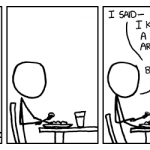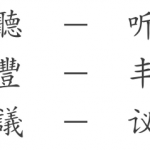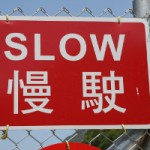Articles in the ‘Intermediate’ category Page 43
-
The 10,000 hour rule – Blood, sweat and tears
The 10,000 hour rule is quite simple. It states that it takes roughly 10,000 hours of practice to become really good at something. The most important lesson here is that talent is far less important that people think. Even towering geniuses work very hard. Blood, sweat and tears are what counts in the end, not talent.
Read → -
Use the benefits of teaching to boost your own Chinese learning
Teaching is a very powerful way of learning. Explaining complicated topics with simple language helps you grasp them and remember them. If you don’t have someone to teach, you can imagine that you have and teach yourself. Making simple explanations explicit works almost as well as real teaching.
Read → -
When perfectionism becomes an obstacle to progress
Perfectionism is usually regarded as something positive, perhaps even necessary. Scoring 100% on an exam is good, isn’t it? No, it’s not. In this article, I explain why perfectionism is bad when learning a language. Aiming for 90% is far better than aiming for 100%. This is being smart, not lazy.
Read → -
Making progress in Chinese in spite of praise
Praise is a double-edged sword. On the one hand, it’s encouraging and makes it more rewarding to study. On the other hand, however, if you use other people’s praise as a true indication of your own ability, you’re in deep trouble. Feel encouraged, but it’s essential that you don’t trust native speakers when they tell you your Chinese is great!
Read → -
Learning simplified and traditional Chinese
Learning traditional characters if you know simplified or vice versa is a lot easier than beginners tend to think. Generally, you don’t need to worry, because at an advanced level, learning both is quite easy. This article is about simplified/traditional and how to learn both.
Read → -
Learn by exaggerating: Slow, then fast; big, then small
If you want to speak or write quickly, you should start out by doing it slowly. Mimicking native speed early will just lead to sloppy language and bad communication. Expose your errors so that you have a chance to correct them.
Read → -
Can you become fluent in Chinese in three months?
Can you (or Benny Lewis) become fluent in Chinese in three months? I think the answer is no, but instead of just being negative, I’ve tried to describe some problems and offer some help on how to solve them.
Read → -
If you want to master Chinese, make long-term investments
It’s easy and perhaps natural to spend the minimum amount of effort to overcome a problem, but this will bring problems in the long run. If we want to reach long-term goals such as mastering Chinese, we need to adopt a long-term approach. What makes sense to pass your next exam isn’t necessarily what makes sense if you want to really learn what you’re studying.
Read → -
Chinese reading speed: Learning how to read ten lines at a glance
Reading quickly is useful when taking tests and in any situation where you want consume large volumes of test. However, simply reading a lot is not the most efficient way to reach high speeds, you actually need to focus on reading speed to do that. In this article I discus various methods, tips and tricks, along with some thoughts on goals and problem analysis.
Read → -
Mapping the terra incognita of Chinese vocabulary
When it comes to vocabulary, it is sometimes difficult to cover all the necessary areas. If we move on to more advanced levels, we need to make sure that we actively strive to plug the holes that might exist on more basic levels. This article is about strengthening the foundations and expanding vocabulary.
Read →









